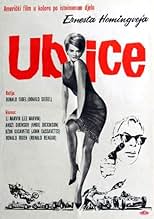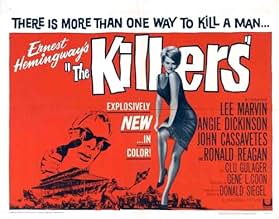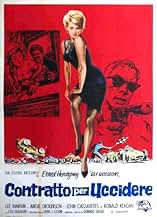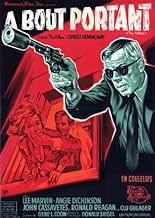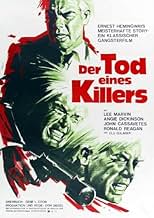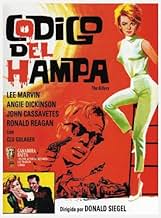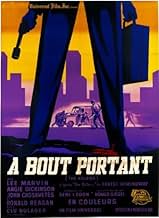CALIFICACIÓN DE IMDb
7.0/10
10 k
TU CALIFICACIÓN
Sorprendidos luego de que la víctima contratada no haya intentado huir de ellos, dos sicarios profesionales intentan averiguar quién los contrató y por qué.Sorprendidos luego de que la víctima contratada no haya intentado huir de ellos, dos sicarios profesionales intentan averiguar quién los contrató y por qué.Sorprendidos luego de que la víctima contratada no haya intentado huir de ellos, dos sicarios profesionales intentan averiguar quién los contrató y por qué.
- Dirección
- Guionistas
- Elenco
- Ganó 1 premio BAFTA
- 1 premio ganado y 1 nominación en total
Irvin Mosley Jr.
- Mail Truck Guard
- (as Irvin Mosley)
- Dirección
- Guionistas
- Todo el elenco y el equipo
- Producción, taquilla y más en IMDbPro
Opiniones destacadas
One of Hollywood's greater contract directors, Donald Siegel, brought Hemmingway's short story to TV, but NBC turned it down because, for 1964, it was too damn brutal. Although it pales in comparison to the 1946 original, this cheap (thanks to the gawd-awful production values of Universal in the sixties) remake holds it own.
When button-men Lee Marvin and Clu Gulager show up at a school for the blind to empty their silenced revolvers into former race-car driver John Cassavetes, they don't expect him to just stand there and take it. Marvin, exuding clean-smelling and lean menace and Gulager, a carrot-juice swilling sociopath travel cross-country in their search for Cassavetes' story. They find that the race driver, washed up after a near-fatal crash gains employment with mobster Ronald Reagan (I can just see Ronnie giving Gorbachev the same look at the 1986 summit that he gives Cassavetes when the driver challenges the mobster for control of Reagan's girl, Angie Dickinson). After lots of double-crosses and a fair amount of "why did he or she do that?," Marvin comes calling at Reagan's door.
Lee Marvin was excellent when portraying a killing machine and he holds the movie together. He and Gulager are there to punctuate the sometimes good and sometimes not-so-good flashbacks and they are suave and eerily debonair grim reapers. If anything, they're more interesting than the flashbacks; all good action flicks need good bad guys and Reagan looks too bored with the whole thing. Is it possible that, after seeing him so successful and upbeat for eight years in the White House, a grim and petty Reagan seems anachronistic? Yet, it really is Marvin who makes this movie rise above the cheap production values, the cheesy matte photography, and the canned John(ny) Williams score.
Marvin was about to begin a string of successes that would last into the early seventies. That voice is so distinctive! When he talked, he sounded, as another reviewer once said, "like a dinosaur growling." He is so evil and you can't stop liking him. Although Marvin and Robert DeNiro are completely different actors, they both have the same effect on me when they inhabit the screen--I stop doing everything else and just watch them. Pure charisma. When asked by David Letterman why he was so popular, Lee Marvin simply grinned and, with his index finger extended, growled, "Ratatatat!" Don Siegel would go on to make other tough movies; his style was clean, tough, and with just enough style to leave the audience with a satisfied taste in it's mouth. Under his direction, Clint Eastwood would establish himself as a superstar. One can only imagine how far Marvin would have gotten under the command of the button-man director!
When button-men Lee Marvin and Clu Gulager show up at a school for the blind to empty their silenced revolvers into former race-car driver John Cassavetes, they don't expect him to just stand there and take it. Marvin, exuding clean-smelling and lean menace and Gulager, a carrot-juice swilling sociopath travel cross-country in their search for Cassavetes' story. They find that the race driver, washed up after a near-fatal crash gains employment with mobster Ronald Reagan (I can just see Ronnie giving Gorbachev the same look at the 1986 summit that he gives Cassavetes when the driver challenges the mobster for control of Reagan's girl, Angie Dickinson). After lots of double-crosses and a fair amount of "why did he or she do that?," Marvin comes calling at Reagan's door.
Lee Marvin was excellent when portraying a killing machine and he holds the movie together. He and Gulager are there to punctuate the sometimes good and sometimes not-so-good flashbacks and they are suave and eerily debonair grim reapers. If anything, they're more interesting than the flashbacks; all good action flicks need good bad guys and Reagan looks too bored with the whole thing. Is it possible that, after seeing him so successful and upbeat for eight years in the White House, a grim and petty Reagan seems anachronistic? Yet, it really is Marvin who makes this movie rise above the cheap production values, the cheesy matte photography, and the canned John(ny) Williams score.
Marvin was about to begin a string of successes that would last into the early seventies. That voice is so distinctive! When he talked, he sounded, as another reviewer once said, "like a dinosaur growling." He is so evil and you can't stop liking him. Although Marvin and Robert DeNiro are completely different actors, they both have the same effect on me when they inhabit the screen--I stop doing everything else and just watch them. Pure charisma. When asked by David Letterman why he was so popular, Lee Marvin simply grinned and, with his index finger extended, growled, "Ratatatat!" Don Siegel would go on to make other tough movies; his style was clean, tough, and with just enough style to leave the audience with a satisfied taste in it's mouth. Under his direction, Clint Eastwood would establish himself as a superstar. One can only imagine how far Marvin would have gotten under the command of the button-man director!
This remake of the classic film with the same name (1946) by Robert Siodmak deals with two hired killers (Lee Marvin , Clu Gulager in similar role to William Conrad and Charles McGraw) who murder a man (John Cassavetes replacing Burt Lancaster) at a blind school . The cold-bloody assassins look into his past and by means flashbacks , attempting to solve leads as to why their victim calmly waits for his death and find tracks to a 100.000 dollars robbery . The gunmen discovering his involvement with crime boss (Ronald Reagan , alike role Alfred Dekkker ) and the gangster's moll (Angie Dickinson in the character of Ava Gardner).
This noir film packs action , thrills, suspense, tension , thundering drama and a mighty punch in some exciting scenes . It's loosely based very vaguely on a short story by Ernest Hemingway and originally pretended for television but exhibited to the cinemas due a its lots of violence . This thrilling story with intricate argument plenty of turns and twists , revolves around two assassins revealing surprise after surprise . Noteworthy portrayals come from menacing Ronald Reagan as a racketeer in his last movie, and of course Lee Marvin and Clu Gulager give towering performances as the gunfighters . There's also a magnificent action from John Cassavetes in the pivotal role and Angie Dickinson as gorgeous Femme Fatale and shooting to stardom in one of his first films . Atmospheric musical score by John Williams , subsequently famous as composer of Steven Spielberg films . Rating : Better than average . It's a good film that ensures the nervous intrigue never lets up from the first moment and realized in efficient style by Donald Siegel , then at the peak of his Hollywood career and future author of Charly Varrick, Coogan's bluff and Dirty Harry and sequels. Well worth watching .
This noir film packs action , thrills, suspense, tension , thundering drama and a mighty punch in some exciting scenes . It's loosely based very vaguely on a short story by Ernest Hemingway and originally pretended for television but exhibited to the cinemas due a its lots of violence . This thrilling story with intricate argument plenty of turns and twists , revolves around two assassins revealing surprise after surprise . Noteworthy portrayals come from menacing Ronald Reagan as a racketeer in his last movie, and of course Lee Marvin and Clu Gulager give towering performances as the gunfighters . There's also a magnificent action from John Cassavetes in the pivotal role and Angie Dickinson as gorgeous Femme Fatale and shooting to stardom in one of his first films . Atmospheric musical score by John Williams , subsequently famous as composer of Steven Spielberg films . Rating : Better than average . It's a good film that ensures the nervous intrigue never lets up from the first moment and realized in efficient style by Donald Siegel , then at the peak of his Hollywood career and future author of Charly Varrick, Coogan's bluff and Dirty Harry and sequels. Well worth watching .
When two hitmen kill Johnny North, it sticks with them why he simply stood ready to die and didn't bother trying to run or fight them. They look into his past and find he was once a successful driver of racing cars until an accident left him unable to compete in the big leagues again. They trace his story looking for money he is alleged to have stolen but find a complex tale of lies and deception.
I have not seen the original film so I was free from the burden of comparison when I watched this and I was maybe the better for it as I hear good things about the original. This version was made for television but given a cinema release due to it's violent content (which is really nothing by today's standards). The plot is interestingly told as we already know the fate of North, the only question is how he came to it and what happened to the $1,000,000 he supposedly made off with. It unfolds well and ends with a typically gritty denouncement.
The tone of the film loses the dark black & white of the noir genre in favour of bright daylight and colourful sets with a gritty violent edge to everything. This works well and it stands up today due to recent returns to this type of film thanks to Pulp Fiction's success (and many others of course). Like I said it isn't shocking as it may once have been but it works well as a tough little thriller.
Lee Marvin is perfectly cast and he carries the main part of the modern telling of the film. Likewise Cassavetes is really good as North and you can actually see him change his character from the brash driver to a broken man by the end. Dickinson is a good femme fatale and does it in such a way that she doesn't wear it on her sleeve or have a badge that says `I'm a femme fatale' in a way that some have done it here you only get a sense of who she is towards the end of the film. Ronald Reagan is good in his last acting role before entering politics.
Overall this is an effective film. It lacks it's own sense of style but is tough and enjoyable and it's hard edge is still evident today even if the shock value of the violence has faded as the audience has become more and more used to seeing violence as a mainstay of cinema.
I have not seen the original film so I was free from the burden of comparison when I watched this and I was maybe the better for it as I hear good things about the original. This version was made for television but given a cinema release due to it's violent content (which is really nothing by today's standards). The plot is interestingly told as we already know the fate of North, the only question is how he came to it and what happened to the $1,000,000 he supposedly made off with. It unfolds well and ends with a typically gritty denouncement.
The tone of the film loses the dark black & white of the noir genre in favour of bright daylight and colourful sets with a gritty violent edge to everything. This works well and it stands up today due to recent returns to this type of film thanks to Pulp Fiction's success (and many others of course). Like I said it isn't shocking as it may once have been but it works well as a tough little thriller.
Lee Marvin is perfectly cast and he carries the main part of the modern telling of the film. Likewise Cassavetes is really good as North and you can actually see him change his character from the brash driver to a broken man by the end. Dickinson is a good femme fatale and does it in such a way that she doesn't wear it on her sleeve or have a badge that says `I'm a femme fatale' in a way that some have done it here you only get a sense of who she is towards the end of the film. Ronald Reagan is good in his last acting role before entering politics.
Overall this is an effective film. It lacks it's own sense of style but is tough and enjoyable and it's hard edge is still evident today even if the shock value of the violence has faded as the audience has become more and more used to seeing violence as a mainstay of cinema.
Don Siegel's 'The Killers' is a diamond in the rough! Initially filmed for television, its technical limitations are easily overlooked as they are more than compensated for by the drive of the no-nonsense narrative, and the high standards of the acting. Caught somewhere between Kubrick's 'The Killing' and Boorman's 'Point Blank', it may not be as flamboyantly impressive as either, but it is just as memorable in its own low key way.
Quentin Tarantino has admitted that the structure of 'The Killing' has influenced him, but after watching 'The Killers', one must question whether this movie is also high on his list. Especially as the cooler-than-thou hit-men played by Lee Marvin and Clu Gulager almost anticipate Travolta and Jackson's similarly quirky ones in 'Pulp Fiction' thirty years later. Just like Vincent and Jules, Charlie and Lee are eccentric and likable when "off duty" and brutal sociopaths when on. Lee Marvin is one of Hollywood's legendary screen tough guys, and his performance here is as good as any he ever did, but the real stand out for me is Clu Gulager's health nut contract killer. He just about steals every scene he is in. Up to this point he was mainly known as a Western TV star. Why this role didn't launch him into a Bruce Dern/Harry Dean Stanton/Dick Miller style career baffles me. Instead he was mainly consigned to the "made for TV" wasteland, and never got the breaks his talent deserved.
Marvin and Gulager's star turns are backed up by strong supporting performances from John Cassavetes, as their enigmatic "job", Angie Dickinson, a double-crossing femme fatale, and Ronald Reagan in a surprising turn as a nasty gangster. Also keep an eye out for a dialogue-free cameo by a very young looking Seymour Cassel!
'The Killers' looks better and better as the years go by. Not without flaws, sure, and calling it a masterpiece would be overkill, but it's a movie that was ahead of it's time in many ways, and it can't help but impress discerning fans of 50s/60s b-grade crime movies, film noir, or Sam Fuller.
Quentin Tarantino has admitted that the structure of 'The Killing' has influenced him, but after watching 'The Killers', one must question whether this movie is also high on his list. Especially as the cooler-than-thou hit-men played by Lee Marvin and Clu Gulager almost anticipate Travolta and Jackson's similarly quirky ones in 'Pulp Fiction' thirty years later. Just like Vincent and Jules, Charlie and Lee are eccentric and likable when "off duty" and brutal sociopaths when on. Lee Marvin is one of Hollywood's legendary screen tough guys, and his performance here is as good as any he ever did, but the real stand out for me is Clu Gulager's health nut contract killer. He just about steals every scene he is in. Up to this point he was mainly known as a Western TV star. Why this role didn't launch him into a Bruce Dern/Harry Dean Stanton/Dick Miller style career baffles me. Instead he was mainly consigned to the "made for TV" wasteland, and never got the breaks his talent deserved.
Marvin and Gulager's star turns are backed up by strong supporting performances from John Cassavetes, as their enigmatic "job", Angie Dickinson, a double-crossing femme fatale, and Ronald Reagan in a surprising turn as a nasty gangster. Also keep an eye out for a dialogue-free cameo by a very young looking Seymour Cassel!
'The Killers' looks better and better as the years go by. Not without flaws, sure, and calling it a masterpiece would be overkill, but it's a movie that was ahead of it's time in many ways, and it can't help but impress discerning fans of 50s/60s b-grade crime movies, film noir, or Sam Fuller.
I recently saw this at the 2008 Palm Springs Film Noir Festival. Not really Film Noir as it was made after the genre had passed and is in color and features no detectives or private eyes and not even a film as it was originally intended as the very first made-for-television movie. Produced by Universal's Revue Studios it was deemed too violent for television. It of course isn't too violent by today's standards and NBC censors did call for revisions of the movie and since there are only a few questionable scenes It could have been easily done but they left it as was and it didn't make it's May of 1964 television premier. Instead it went to theaters and drive ins in July of 1964. Long-time film and television director Don Siegel directs. His most noted work would still come late in his career with Clint Eastwood in "Coogan's Bluff", "Two Mules for Sister Sara", "The Beguiled", "Dirty Harry" and "Escape From Acatraz" and John Wayne in "The Shootist" and Charles Bronson in "Telefon." This film is as different from the 1946 film as that film is as different from the short story by Earnest Hemingway that both film borrow from. The 1946 film is noted for being Burt Lancaster's first film role and the 1964 film is noted for being Ronald Reagan's last film role. Seasoned hit-man Charlie Storm (Lee Marvin) and young enforcer sidekick Lee (Clu Gulager) have been hired for larger than usual fee to knock off a retired professional race car driver who now teaches shop class in a school for the blind. A series of flashbacks tell the story of Johnny North (John Cassavetes) and his mechanic Earl Sylvester (Claude Akins) and the femme fatale Sheila Farr (Angie Dickenson) who comes into their lives. Sheila is the kept woman of mobster Jack Browning (Ronald Reagan) whose gang includes Mickey Farmer (Norma Fell) and George Flemming (Robert Phillips). Also in the cast are a couple of familiar and wonderful character television actors in small support roles with Kathleen O'Malley and Burt Mustin. Music score by John Williams when he was a contract composer before he made it big the film also features a Henry Mancini song "Too Little Time" with an on screen performance by jazz singer Nancy Wilson. Screenplay adaptation by Gene L. Cook and director Siegel this deserves a look especially from it's great cast and historical perspective. It keeps flowing pretty smoothly and never bogs down. Cassavetes seems uncomfortable in the role and their really isn't much on screen chemistry between he and Dickenson but Dickenson is delicious as the femme fatale and Marvin and Gulager, especially Gulager's smooth wit, are great as the hit team. Angie Dickenson was on hand at the screening for an audience Q&A following the film and it was great to see her. I liked this and would give this an 7.5 out of 10.
¿Sabías que…?
- TriviaAccording to Don Siegel, it was the policy at "Universal" at the time to shoot the last scene of the film first. On that first day of filming, according to Siegel and Clu Gulager, Lee Marvin arrived late and had been drinking, but because he had no dialogue, the scenes were used as shot.
- ErroresAt the start of the race, Johnny presses the accelerator to the floorboard with his right foot. However, his left foot is nowhere near the clutch. In a manual transmission, the clutch would need to be released while simultaneously accelerating.
- Citas
Charlie Strom: Lady, I don't have the time.
- Créditos curiososThe style of the film's credits reflects its original made-for-TV origins: in 1960s TV movies, Stars, Co-stars, and Featured Players were listed only in the opening credits, while supporting players were listed only in the closing credits.
- ConexionesFeatured in Biography: Angie Dickinson: Tinseltown's Classiest Broad (1999)
- Bandas sonorasToo Little Time
Music by Henry Mancini
Lyrics by Don Raye
Sung by Nancy Wilson
[Johnny and Sheila dance to the song performed at the nightclub]
Selecciones populares
Inicia sesión para calificar y agrega a la lista de videos para obtener recomendaciones personalizadas
Detalles
Taquilla
- Presupuesto
- USD 750,000 (estimado)
- Total a nivel mundial
- USD 9,261
- Tiempo de ejecución1 hora 33 minutos
- Color
- Relación de aspecto
- 1.85 : 1
Contribuir a esta página
Sugiere una edición o agrega el contenido que falta



